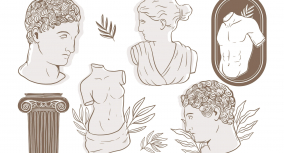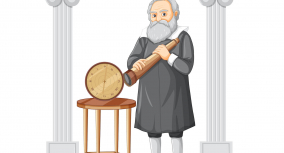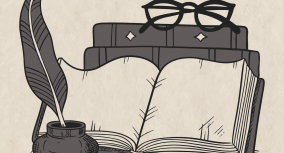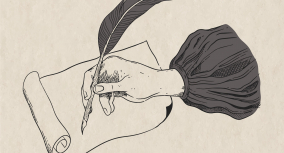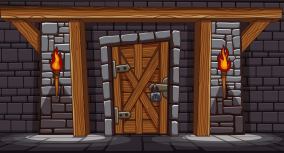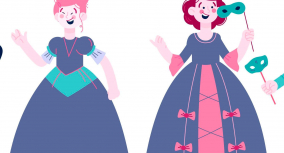Hamlet’s themes of death, revenge, doubt, corruption, madness, appearance vs. reality, and the complexity of action remain as intriguing and profound today as they were back when the play was written. Just like other famous works of William Shakespeare, Hamlet is still staged regularly, often with new, unexpected interpretations.
The themes of Hamlet, relatable and influential today, are also frequently used in various adaptations. For example, one of the most radical reimagining of the play, Heiner Müller’s The Hamletmachine (1977), successfully places Shakespeare’s themes into the postmodern context of the DDR while sticking to the original spirit. Such bold interpretations are possible not only because of the timeless nature of themes in Hamlet but also due to their inherent ambiguity.
📍 4 Leading Hamlet Themes
Here are the four crucial themes Shakespeare raises in Hamlet:
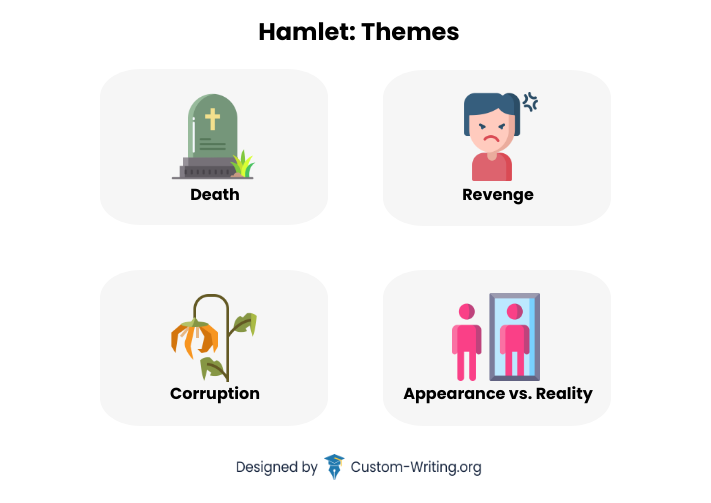
💀 Theme of Death in Hamlet
Death in Hamlet is a central theme in the play. Throughout the plot, Hamlet is obsessed with the idea of death. He examines it from multiple perspectives:
- He thinks about the possibility of the afterlife when he encounters the Ghost.
- In Act 5 Scene 1, he considers the horrors of physical death when he finds the skull of Yorick.
- In Act 3 Scene 1, he reflects on suicide as an option to escape the sufferings of life in his famous soliloquy, “To be or not to be.”
Death as a theme is deeply intertwined with Hamlet’s perceptions of spirituality and truth – yet it is also a great source of the protagonist’s uncertainty. On the one hand, death promises a resolution to Hamlet’s inner turmoil. On the other hand, it’s strongly associated with the injustice of the King’s murder and fuels Hamlet’s thirst for revenge.
At the beginning, Hamlet was supposed to become an agent of vengeance, which is what most readers would expect from a revenge play. However, Shakespeare subverts expectations by making the revenge plot less prominent and focusing on other aspects, such as the ambiguity of moral choices.
Instead of actively seeking vengeance, Hamlet is torn by contradictions, which result in him becoming an agent of death. Due to his choices, almost every central character dies: Polonius, Ophelia, Gertrude, Claudius, Laertes, and Hamlet himself.
Hamlet Quotes about Death
To be or not to be—that is the question
Hamlet, Hamlet, Act 3, Scene 1
This is the most famous quote about death in the entire play. It’s taken from one of Hamlet’s soliloquies, where he considers contradictory views about life and death. This specific phrase addresses the question of whether dying is better than living.
To die: to sleep;
Hamlet, Hamlet, Act 3, Scene 1
No more; and by a sleep to say we end
The heart-ache and the thousand natural shocks
That flesh is heir to, ’tis a consummation
Devoutly to be wish’d.
In this quote from the same monologue, Hamlet compares death to sleep, which is a state of peacefulness as opposed to the suffering of “waking” life. It’s hard to tell if he is seriously considering suicide, but in this quote, he clearly argues that death is a legitimate way to end all the turmoil he’s experiencing.
…death,
Hamlet, Hamlet, Act 3, Scene 1
The undiscover’d country from whose bourn
No traveller returns,..
This phrase from the same soliloquy hints at Hamlet realizing that death is irreversible since no one ever had a chance to really come back from the dead. In this context, Hamlet asserts that if you die, there is no way to live again. Besides, with no one to tell about the state of being dead, it is impossible to know what it’s really like. This uncertainty is one of the key reasons why Hamlet is so hesitant about choosing between “being and not being.”
Let me see.
Hamlet, Hamlet, Act 5, Scene 1
[Takes the skull]
Alas, poor Yorick! I knew him, Horatio: a fellow
of infinite jest, of most excellent fancy: he hath
borne me on his back a thousand times; and now, how
abhorred in my imagination it is! my gorge rims at
it. Here hung those lips that I have kissed I know
not how oft. Where be your gibes now? your
gambols? your songs? your flashes of merriment,
that were wont to set the table on a roar? Not one
now, to mock your own grinning? quite chap-fallen?
In this quote, Hamlet talks about his beloved jester, Yorick. He examines his skull and is startled by how much it differs from the face of his childhood companion.
This speech is crucial for understanding Hamlet’s fears and hesitation. Throughout the play, he is preoccupied with the universality of death, and in this scene, he examines it from the physical perspective. Up to this moment, he has hardly confronted the reality of bodily decay, which may be one of the reasons why the skull shocks him so much.
⚔️ Theme of Revenge in Hamlet
Hamlet is often called a revenge tragedy. Indeed, it is centered around plotting an act of vengeance, and the protagonist spends plenty of time thinking about murdering Claudius. However, since the play subverts the traditional tropes of a revenge tragedy, this theme functions more like a catalyst than the foundation of the plot.
Hamlet’s central conflict stems from his inability to act on the Ghost’s instructions. His hesitation has 3 main reasons:
- He wants to be sure that Claudius is guilty. He devises an elaborate investigation plan, notably staging the murder of King Hamlet and pretending to be mad.
- He doubts whether the Ghost is actually his father’s spirit or a devil that “assumed a pleasing shape” to damn him. Just like with other ambiguous aspects in the play, it’s impossible to state outright which possibility is correct.
- He needs to be certain Claudius is not going to heaven after death, which is why he refuses to kill his uncle while the latter is praying. This reason is closely tied to the unknowable nature of the afterlife, which keeps the protagonist hesitating.
Hamlet waits till the end of the play to kill Claudius, which ends up almost accidental since Claudius is forced to drink the poison he himself prepared for Hamlet. Even though the villain dies in the end, this outcome can hardly be called a successful revenge. Hamlet himself is deadly wounded in the process: his acceptance of death’s inevitability may have been the reason why he was ready to finally take action.
Interestingly, Hamlet is not the only character who is concerned with revenge in the play. Fortinbras and Laertes also actively seek to avenge their fathers. These two characters serve as foils underscoring Hamlet’s inaction in his vengeance.
Hamlet Quotes about Revenge
Revenge his foul and most unnatural murder.
Hamlet, Ghost, Act 1, Scene 5
In this revenge quote from Hamlet, the Ghost asks his son to avenge his murder. In Act 1, Scene 5, Hamlet learns that Claudius is responsible for the death of his beloved father. He already hates his uncle, and having learned about the “foul and most unnatural murder,” he is willing to believe what the Ghost says. Later in the play, he starts doubting whether this story is true.
Now might I do it pat, now he is praying;
Hamlet, Hamlet, Act 3, Scene 3
And now I’ll do’t. And so he goes to heaven;
And so am I revenged. That would be scann’d:
A villain kills my father; and for that,
I, his sole son, do this same villain send
To heaven.
In Act 3, Scene 3 of Hamlet, the young prince has an opportunity to kill Claudius but stops when he finds his uncle praying. Hamlet is afraid that Claudius will go to heaven if he acts out his revenge at the moment of prayer.
Revenge should have no bounds.
Hamlet, King Claudius, Act 4, Scene 7
In this quote from Act 4, Scene 7, Claudius tries to convince Laertes to kill Hamlet by stating that revenge should happen no matter what. This quote is ironic because it’s said by Claudius, who, like no other character in the play, deserves to be the target of revenge.
O, from this time forth,
Hamlet, Hamlet, Act 4, Scene 4
My thoughts be bloody, or be nothing worth!
In this quote, Hamlet expresses readiness to carry out his revenge no matter what, yet this readiness will soon be yet again replaced by hesitation. Just like that, throughout the play, the protagonist oscillates between determination and inability to act.
🤔 Theme of Doubt in Hamlet
Doubt is a pervasive theme in Hamlet, with the protagonist’s hesitation and unreliability casting suspicion on all his actions and decisions. Readers and scholars alike come up with countless attempts to interpret Hamlet’s inability to act—and, since the play is ambiguous on purpose, multiple interpretations can be seen as valid, even those contradicting each other.
Here are the main perspectives from which you can approach to analyze the theme of doubt in this tragedy.
- Hamlet’s suspicion and uncertainty. The protagonist continually contemplates whether Claudius is guilty of his father’s death but never finds a definitive answer. The nature of the Ghost (and whether he existed in the first place) adds ambiguity to Hamlet’s perception of events.
- Inaction and internal conflict. Hamlet is torn by inner contradictions and conflicts that paralyze him at the critical turns of the plot, continuously delaying its resolution. One reason for that could be Hamlet’s intelligence, which makes him see multiple outcomes as equally pointless, with no definitive option that he can confidently act upon.
- Infectious nature of doubt. Hamlet’s hesitation affects others as well, most notably Gertrude and Ophelia. Both these characters deeply care for him, and his behavior causes them to start doubting him and his sanity.
- The audience. Hamlet’s conduct instills an atmosphere of distrust and makes it impossible to make a uniform opinion about his sanity, real motives, and feelings. The audience can further doubt the nature of the Ghost, King Hamlet’s murder, and Gertrude’s relationship with Claudius.
Considering multiple perspectives will help you get a well-rounded understanding of the play’s complexity and of Hamlet as an ambiguous, highly intelligent character.
Quotes about Doubt in Hamlet
I did love you once […]
Hamlet, Hamlet, Act 3, Scene 1
You should not have believed me
During Hamlet’s confrontation with Ophelia, it remains unclear to the audience whether he never loved her in the first place or is pretending to hate her, suspecting that Polonius might be eavesdropping on them. Ophelia, too, is deeply perplexed by his reactions, which are so unlike the Hamlet she knew. It’s also possible that Hamlet himself is genuinely unsure about his feelings towards her.
To be or not to be—that is the question
Hamlet, Hamlet, Act 3, Scene 1
This famous line reflects not only Hamlet’s attitude towards death but also his doubts about whether it’s worth to live at all. His uncertainty extends beyond practical matters such the nature of his father’s murder and the necessity of vengeance. He’s also troubled by the philosophical questions without answers, considering multiple perspectives at once and struggling to make up his mind.
😈 Corruption Theme of Hamlet
In Hamlet, there is a strong connection between the ruler’s moral character and the overall “health” of the nation.
Here is how it’s shown:
- Denmark of the past, with a strong and morally righteous King Hamlet, is described as prosperous.
- Claudius, the new ruler, is corrupt and manipulative. His rule is described in terms reminiscent of a disease, which is further underscored by the fact that he murdered his predecessor with poison.
Hamlet is acutely aware of this pervasive corruption, repeatedly expressing his dissatisfaction with the world as a whole (for him, it’s an “unweeded garden” possessed by “things rank and gross in nature”) and with people (“quintessence of dust.”) This constant disillusionment serves as one of the reasons why he contemplates about death so much, wishing to “melt, thaw and resolve […] into a dew” to escape from the corrupt world.
Hamlet Quotes about Corruption
Something is rotten in the state of Denmark.
Hamlet, Marcellus, Act 1, Scene 4
This is one of the most famous Hamlet corruption quotes said by Marcellus, the guard of the fort, after he sees the Ghost. This phrase demonstrates that things in Denmark are going deeply wrong, especially considering sudden change in power and Gertrude’s new marriage.
For goodness, growing to a plurisy,
Hamlet, King Claudius, Act 4, Scene 7
Dies in his own too much…
This quote is said by Claudius to Laertes, meaning that virtue, when it is too abundant, can cause more harm than good. Since Claudius himself is far from virtuous, this phrase can be seen as ironic foreshadowing.
I’ faith, if he be not rotten before he die–as we
Hamlet, Gravedigger, Act 5, Scene 1
have many pocky corses now-a-days, that will scarce
hold the laying in–he will last you some eight year
or nine year: a tanner will last you nine year
A gravedigger uses this phrase to talk about both physical and spiritual corruption. For him, dealing with death is a part of his job, so he approaches it jokingly, stating that some people are “rotten” before they die. Hamlet appreciates the gravedigger’s witty remarks that echo his own nihilism.
🤯 Theme of Madness in Hamlet
Madness is a very important dimension of Hamlet, as the audience is persistently challenged with the question of whether it’s real or not.
Early on, Hamlet openly states his intention to convince the court of his insanity by putting up an act. However, as the plot unfolds, he seems to start sliding into madness for real, which makes it increasingly difficult to interpret his actions.
At the start of the play, Hamlet repeatedly hints at his madness being played out, openly telling Horatio and Marcellus that he is going “to put an antic disposition on.” However, the consecutive attacks on Ophelia and Gertrude and especially the episode in the King’s bedroom, where he alone sees the Ghost, suggest that Hamlet may be losing his sanity. The recent trauma of his father’s murder by his uncle, who becomes his current stepfather, adds additional strain that the protagonist’s fragile psyche can hardly process.
Despite these arguments speaking in favor of Hamlet’s actual madness, there’s also enough space for alternative interpretations of him intentionally positioning himself as a madman to escape punishment and execute revenge as planned.
Quotes about Madness in Hamlet
I am but mad north-north-west. When the wind is
Hamlet, Hamlet, Act 2, Scene 2
southerly, I know a hawk from a handsaw.
In this quote, Hamlet explains the nature of his madness to Rosencrantz and Guildenstern. He says that he is faking it because he can switch his act on and off like the wind that blows from time to time.
White his shroud as the mountain snow—
Hamlet, Ophelia, Act 4, Scene 5
Larded all with sweet flowers,
Which bewept to the ground did not go
With true-love showers.
These lines are a part of Ophelia’s song in Act 4, Scene 5. With Hamlet gone and Polonius dead, Ophelia goes mad. She goes around the castle, collects flowers with symbolic meanings, and sings songs. These songs become a verbalization of her grief over her lost father and her lost love.
Alas, he’s mad!
Hamlet, Gertrude, Act 3, Scene 4
When Hamlet confronts his mother and reveals the truth about Claudius to her, he also tries to convince her that he’s only “mad in craft.” During the same scene, the Ghost reappears again—however, only Hamlet can see him, and his reaction shocks Gertrude. Some interpretations state that the Queen can’t see her late husband because she betrayed his memory. However, it’s still possible that Hamlet indeed experiences a hallucination, proving that he’s losing a grip on reality.
🎭 Appearance vs. Reality Theme of Hamlet
Almost all characters in the play pretend to be something they’re not at some point. For instance, Claudius uses his charisma to appear kind, generous, and caring. These qualities cover up his vicious personality.
The role of women in Hamlet is closely connected to the theme of appearance vs. reality. There are only two women in the play, Gertrude and Ophelia, who are both concerned with Hamlet’s state of mind. Gertrude has to inform Claudius about her son’s behavior, while Ophelia is used by her father, Polonius, as bait for spying on Hamlet. Interestingly, in the scene where Ophelia confronts Hamlet, both characters are putting on an act, further blurring the line between reality and illusion.
As an actor himself, Shakespeare had a profound understanding of the power of theater, which is something he shares with his most famous protagonist. Hamlet is a massive fan of theater: he is delighted to see a group of traveling actors and is deeply touched by an actor’s passionate performance of a monologue about Hecuba. This admiration for theater leads Hamlet to use the power of acting to elicit emotions as a way to verify Claudius’ guilt in killing his father.
In a broader sense, the entire play can be seen as deconstructing the idea of theater as such, with actors pretending to be characters who, in turn, are also pretending – with the “play within a play” adding even more layers to it.
Appearance vs Reality Quotes from Hamlet
Though yet of Hamlet, our dear brother’s death
Hamlet, King Claudius, Act 1, Scene 2
The memory be green, and that it us befitted
to bear our hearts in grief, and our whole kingdom
To be contracted in one brow of woe,
Yet so far hath discresions fought with nature
That we with wisest sorrow think on him
Together with remembrance of ourselves.
In this verse in Act 1, Scene 2, Claudius appears to be a good ruler and a loyal brother who mourns Old Hamlet’s death. He also explains why he married Gertrude so quickly: to protect the kingdom from appearing weak.
Seems, madam? Nay, it is; I know not seems.
Hamlet, Hamlet, Act 1, Scene 2
This quote from Hamlet is key to understanding his views and actions. He’s acutely aware of the difference between “seeming” and actually “being” — particularly in this scene, where he contrasts his genuine mourning with a performative grief that the court puts up.
The Devil hath power to assume a pleasing shape.
Hamlet, Hamlet, Act 2, Scene 2
This quote is connected with Hamlet’s encounter with the Ghost in Act 2, Scene 2. It means that the spirit can be the Devil and not his father because it can assume any form it wants to deceive people.
📚 The Complexity of Action in Hamlet
One of the most interesting analytical perspectives in Hamlet is the complexity of action and the pervasive indecisiveness of human nature. This subject can also be approached from multiple angles, each offering valuable insights:
- Internal struggle. Hamlet is driven by his inner battle between emotions, ethical perspective, and a desire for revenge. That struggle is too devastating and paralyzing for Hamlet to make the final decision and start acting.
- Decisiveness vs. indecision. The play contains several characters juxtaposed with Hamlet in terms of decisiveness. For instance, Claudius embodies bold action, and Laertes acts impulsively and ambitiously. Both of these characters, however, suffer from the disastrous outcomes of their boldness.
- Consequences of actions. By contrasting the inaction of Hamlet with the bold and inconsiderate moves of Claudius and Laertes, Shakespeare shows the tragic unpredictability of action and the complex consequences any step comes with.
When examined from these perspectives, Hamlet’s inaction no longer appears as a purely negative trait. Shakespeare’s play is actually more nuanced than that: it shows that action often results from impulsivity, dubious moral considerations, and illusory certainty, which might cause unpredictable or even tragic results.
Hamlet Quotes about the Complexity of Action
There is nothing either good or bad, but thinking makes it so.
Hamlet, Hamlet, Act 2, Scene 2
This quote illustrates Hamlet’s moral ambiguity as well as his intelligence. He’s aware that nothing is intrinsically good or bad; in fact, the interpretation of ethical categories can differ drastically between people and across cultures. This ambivalence might be one of the reasons why Hamlet doesn’t act on his plan of vengeance right away—revenge as a moral act can be both admirable and questionable, with no clear value assigned to it.
My words fly up, my thoughts remain below;
Hamlet, Claudius, Act 3, Scene 3
Words without thoughts never to heaven go.
This quote is closely connected to the theme of appearance vs. reality. Hamlet refrains from killing Claudius while he’s praying, but later in the scene, it turns out that Claudius was only pretending to pray. The acts of “appearing” to pray and actually “doing” it are profoundly different in meaning but almost indistinguishable outwardly, and this subtle difference ends up (temporarily) saving Claudius’ life.
Thanks for reading our article! Feel free to check out other parts of our study guide to learn more about Hamlet.





